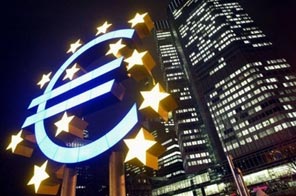Eurozone bank lending contracts further: ECB
FRANKFURT (AFP) - Eurozone bank lending to the private sector contracted again in November, the European Central Bank said on Wednesday, a further sign that critical credit is tight as the economy begins to expand.
Lending shrank by 0.7 percent, the third month running it has been in negative territory. It contracted by 0.8 percent in October and by 0.3 percent in September.
The 16-nation economy crawled out of recession in the third quarter, and economists have warned that businesses trying to rebound might be hobbled by banks placing stricter conditions on extending credit.
Others have pointed to weaker demand for credit owing to the recession, but IHS Global Insight chief European economist Howard Archer highlighted the possible obstacle to growth.
While the latest figure "is undoubtedly influenced markedly by businesses' muted demand for bank financing, it nevertheless maintains concerns that eurozone recovery could be held back over the coming months by a significant number of companies being unable to get the credit that they need," he said.
Growth of the ECB's M3 money supply indicator, which measures cash, deposits and various other financial items, fell meanwhile by 0.2 percent, the first time on record it has posted a negative figure.
M3 had expanded by 0.3 percent in October and analysts polled by Dow Jones Newswires had forecast an increase of 0.4 percent last month.
Lending and money supply data illustrate consumer demand and overall activity in an economy.
Falling figures point to lower demand, which normally means inflation will ease and allow the ECB to cut interest rates. However, the rates are already at a record low of 1.0 percent and are not expected to be cut further.
"Overall, the eurozone money supply and credit data for November support the case for the ECB to only very gradually withdraw its emergency liquidity measures, and to keep interest rates down at 1.0 percent until deep into 2010," Archer said.
"While the eurozone economy is now growing again, it is hardly racing ahead and significant concerns and uncertainties remain over the strength and sustainability of the recovery," he added.






